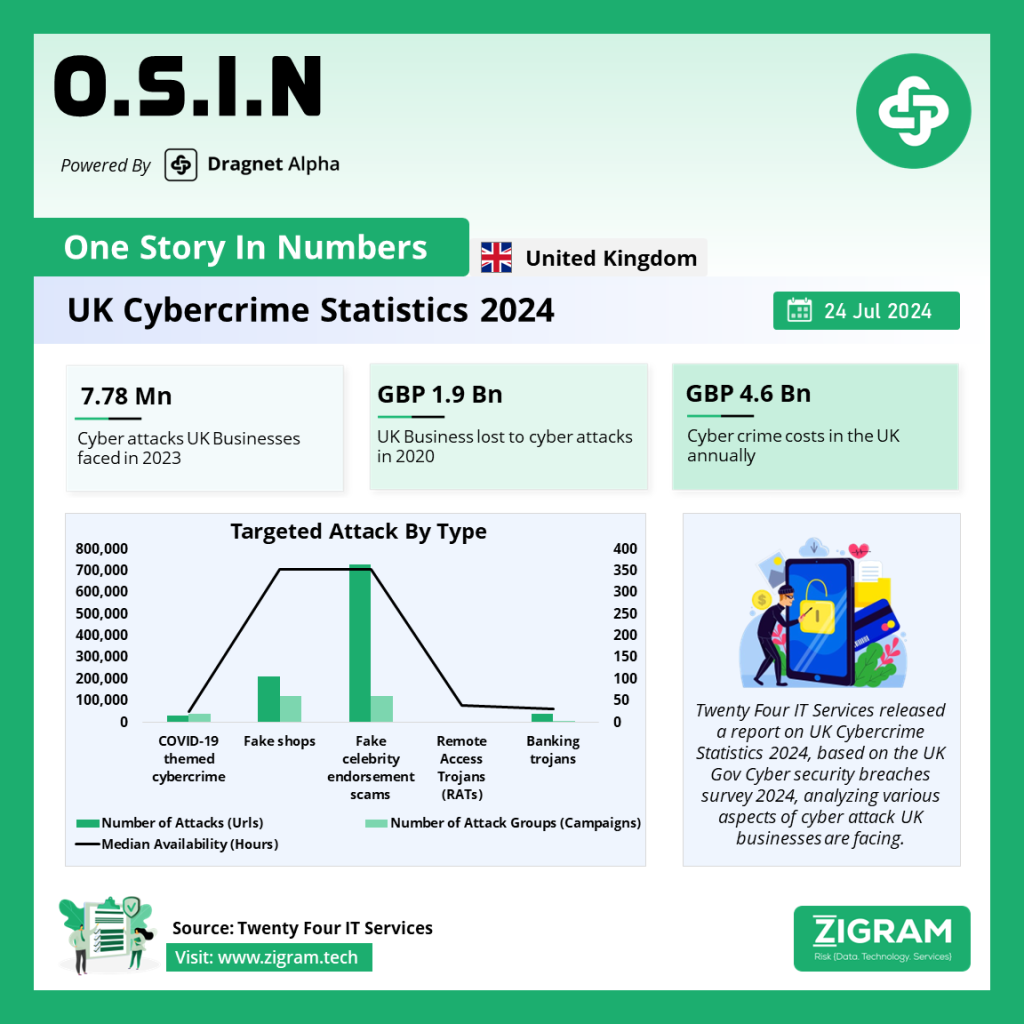Cyber Crime is a growing concern for UK businesses of every size. While the major cyber security incidents that make headlines often involve large corporations, this doesn’t mean smaller businesses are exempt from these threats. In fact, a report from Twenty Four IT Services, small to medium-sized businesses (SMBs/SMEs) are frequently targeted and often less prepared to defend against such attacks.
Alarming Cyber Crime Statistics
Every day, over 560,000 new cyber threats are discovered. A staggering 81% of UK businesses that suffer from a cyber security attack are small to medium-sized businesses. However, it’s important to note that 97% of these businesses could have prevented these attacks with modern and comprehensive cyber security solutions.
The Cost of Cyber Crime in the UK
In 2022, cyber crime cost UK businesses an average of £4,200. The total cost to the UK economy is estimated to be £27 billion per year, with businesses bearing a significant portion of this cost. Recent reports suggest that the average cost to remedy an attack is £21,000. Despite this, only 22% of UK businesses have a formal cybersecurity incident management plan in place. In 2024, only 31% of businesses and 26% of charities undertook a cyber security risk assessment, indicating a lack of adequate preparation.
Common Types of Cyber Crime
One of the most prevalent forms of cyber crime in the UK is fraud, with £1.3 billion lost in 2020. In Yorkshire and Humber alone in 2023, there were over 2,030 reported instances of cyber crime and/or fraud, resulting in more than £19.3 million in financial losses. This includes significant losses from online shopping fraud, with victims losing £63.8 million in 2020.
Other common forms of cyber crime include:
– Computer Misuse: Over 2.3 million cases reported in the UK.
– Unauthorized Access: Over 1 million incidents involving personal information.
– Phishing and Ransomware: These are particularly prevalent, with 84% of businesses experiencing phishing attempts and ransomware attacks increasing by 70% in 2020.
Cyber Crime Statistics for 2024
– 7.78 million: Cyber attacks on UK businesses in 2023.
– 50%: UK businesses reporting cyber attacks or security breaches in the past year.
– 32%: UK charities experiencing cyber attacks or security breaches.
– 70%: Medium businesses reporting cyber attacks or security breaches.
– 74%: Large businesses reporting cyber attacks or security breaches.
– 31%: UK businesses undertaking a cyber security risk assessment in the last year.
– 43%: Businesses insured against cyber security risks, up from 37%.
– 3%: UK businesses and charities adhering to the Cyber Essentials Scheme.
– 43%: UK businesses relying on an external cyber security provider.
How to Prevent Cyber Crime
Preventing cyber crime involves proactive measures to protect yourself, your business, and your personal information.
Key steps include:
1. Keeping Software Up to Date: Ensure all systems and applications are regularly updated to protect against vulnerabilities.
2. Using Strong Passwords: Employ complex and unique passwords for all accounts.
3. Being Cautious of Suspicious Emails or Websites: Educate employees about phishing and other common scams.
4. Using Antivirus Software: Implement reliable antivirus solutions to detect and prevent threats.
5. Practicing Safe Browsing: Avoid visiting untrusted websites or clicking on unknown links.
6. Backing Up Data: Regularly back up important data to mitigate the impact of a potential breach.
Cybercrime is an escalating threat that demands vigilance and proactive measures. By staying informed and implementing robust cyber security practices, businesses can significantly reduce their risk of falling victim to cyber attacks.
Read the full report here
Know more about the product: Dragnet Alpha
Click here to book a free demo.
- #CyberCrime
- #CyberSecurity
- #UKBusiness
- #SmallBusiness
- #SMEs
- #FraudPrevention
- #CyberThreats
- #DataProtection
- #Phishing
- #Ransomware
- #BusinessSecurity
- #CyberAwareness
